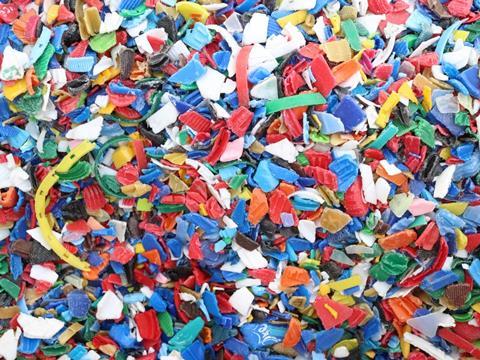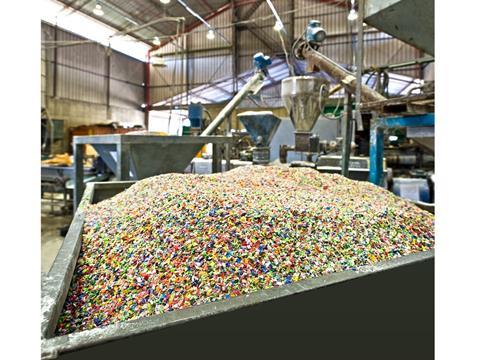
Technology company Polysecure has reported several milestones achieved with its Sort4Cycle technology, which apparently proves the feasibility of a CO2-efficient circular economy for plastics.
With the technology, the company says it can demonstrate automated separation and single-stage sorting of shredded plastics (20 - 80 mm) with a high yield and up to 99.9% purity of the sorted fractions. It can apparently demonstrate ‘comparatively error-free’ NIR (Near Infrared) detection of numerous polymers with the new closed detector. It adds that its fluorescent markers conform with EU requirements for plastics with food contact and can be widely used in plastics processing.
Polysecure reports that the single-stage Sort4Circle technology is more cost-effective from around six sorting fractions than the conventional multi-stage sorting process, which can only blow off one fraction at each sorting stage. Polysecure has further developed the Sort4Circle process and integrated it into a modular pilot sorting plant, enabling sorting tests to be carried out with shredded plastics.
Apparently, feasibility studies with industrial partners have used the pilot line to demonstrate that shredded plastic (20 - 80 mm) can be automatically separated, identified and deposited into many fractions without errors. The sorting tests show that these material streams can be sorted into the desired fractions with a yield of 70 - 90%, with a purity of 99.9% was achieved in the sorted fraction for labelled plastics.
Polysecure says each piece of plastic must first be automatically separated, then consistently measured in a detector protected against the environment. It is then placed error-free in the correct fraction from a sufficient number of fractions to be differentiated.
This process corresponds to letter sorting as it is practiced worldwide. The company states that such an innovation was not necessary until now, as the market was satisfied with recycling rates of less than 10%.
It states that in Europe, only 18.6% of the plastic waste collected in 2020 was processed into a recyclate, but climate protection and resource efficiency require action, as the plastics industry currently accounts for around 5% of greenhouse gas emissions. Polysecure states that “if we continue as we are, the plastics industry will soon be responsible for over 10% of greenhouse gas emissions”, meaning there is “no alternative to the circular economy for plastics”.

Polysecure says the recycled plastics specifically pre-sorted by Sort4Circle can be enriched with new plastics, but at the moment, the amount of recycled material will not be sufficient to cover the demand for plastics. It also states that simulations show 4.7% of a recyclate consists of plastic material loaded with more than five recycling cycles if 40% fresh plastic is always added to each cycle.
After numerous tests on migration and toxicology, conformity of the fluorescent markers with the EU requirements for food contact plastics was achieved at the beginning of October 2023, meaning the fluorescent markers can be used in and on food contact materials.
Last year the Alliance for Beverage Cartons and the Environment – ACE Ireland partnered with Panda to implement robotic sorting technology into its materials recovery facility in Ballymount, Ireland, aiming to improve dedicated sorting and optimize recycling processes. The robot identifies, picks, and sorts cartons into their respective streams using artificial intelligence.
Designed to work with 28 classes of material, it can apparently be installed on existing recycling lines, minimizes disruption to the facility’s operations and lowers the cost of automated sorting.
A few months later, OMV announced plans to invest over €170 million into a fully automatic sorting plant developed by Interzero and produce feedstock for chemical recycling, with an expected annual capacity of up to 260,000 tonnes. It will reportedly provide raw materials for use in the production of virgin polyolefins, with the process set to recover polyolefins and divert them away from thermal recycling without competing with mechanical recycling processes.
If you liked this story, you might also enjoy:
The Brief: How viable is biorecycling for plastics?
Report: How the top brands are progressing on packaging sustainability
The Brief: Using ocean-bound plastic in packaging – how, why and should we?














No comments yet